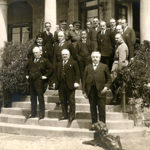Published April 15, 2002
The James Madison Program in American Ideals and Institutions
According to Lionel Robbins’ classic definition, “Economics is the science which studies human behavior as a relationship between ends and scarce means that have alternate uses.” Yet most modern economists assume that economic choice involves only the means and not the ends of human action. The reason seems to be that most modern economists are ignorant of the history of their own discipline before Adam Smith or Jeremy Bentham. Leading economists like Gary Becker attempt to explain all human behavior, including love and hate, as a maximization of “utility.” But historically and logically, an adequate description of economic choice has always required both a ranking of persons as ends and a ranking of scarce goods as means. What is missing from modern economics is an adequate description of the ranking of persons as ends. This is reflected in the absence of a satisfactory microeconomic explanation (for example, within the household) as to how goods are distributed to their final users, and in an overemphasis at the political level on an “individualistic social welfare function,” by which policymakers are purported to add up the preferences of a society of selfish individuals and determine all distribution from the government downwards, as if the nation or the world were one large household. As this “hole” in economic theory is recognized, an army of “neo-scholastic” economists will find full employment for the first few decades of the 21st Century, busily rewriting the Utilitarian “economic approach to human behavior” that dominated the last three decades of the 20th Century.
The attached paper contains two sections that attempt to convey the flavor of my book-in-progress, provisionally titled, God and Money: How to Think About Economics. For reasons that will become apparent, I find it necessary to combine historical, theoretical, and empirical approaches. The first, longer section is from a part of the book called “Personal Economy.” In it, I show that current economic theory cannot fully explain the everyday activities of a typical mother, and put forward an updated version of the traditional economic meanings of love and hate. In the book, the second, shorter section follows (and recapitulates in more technical form) “A Brief History of Economics,” which attempts to make sense of the whole sweep of the history of economic analysis from Aristotle to the present. This part may be skipped by those not interested in either the history of economic theory or modern economic technique.












